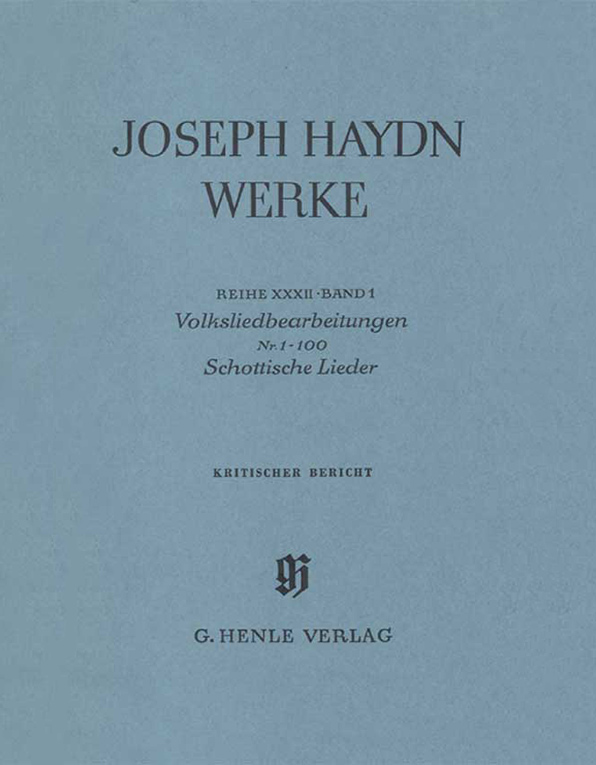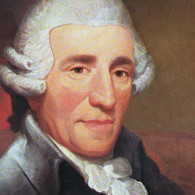
校訂報告

Joseph Haydn
Ser. 32, Vol. 1 | Arrangements of Folk Songs no. 1-100 Scottish Songs
Karl Geiringer
(校訂)
Complete Edition, critical report, paperbound
Voice and miscellaneous instruments
ページ数 32 ,
大きさ 17,0 x 24,0 cm, © 1961
重さ 75 g
HN 5893
·
ISMN 979-0-2018-5893-7
このタイトルを含む他の版
内容/詳細
Scottish Songs for Voice with Violin and Piano (Basso continuo) Hob. XXIa:1-100
1. Mary’s dream
2. John Anderson
3. I love my love in secret
4. Willie was a wanton wag
5. Saw ye my father
6. Todlen Hame
7. Fy gar rub her o'er wi' strae
8. Green grow the rashes
9. The waefu' heart
10. The ploughman
11. Barbara Allen
12. Had awa frae me, Donald
13. Will ye go to Flanders
14. This is no mine ain house
15. Braw lads of galla water
16. O'er bogie
17. I had a horse
18. My boy Tammy
19. By the stream so cool and clear
20. Fy, let us a' to the bridal
21. The shepherd Adonis
22. The white cockade
23. The lass of Livingston
24. John of Badenyon
25. The bonniest lass in a' the world
26. Duncan Davison
27. Leader Haughs and Yarrow
28. Up in the morning early
29. Fife and a' the lands about it
30. I'm o'er young to marry yet
31. My ain kind deary
32. Dainty Davie
33. Pentland hills
34. Duncan Gray
35. Maggy Lauder
36. How can I be sad on my wedding day
37. Nanny o
38. Woo'd and married and a'
39. Blue bonnets
40. The wawking of the fauld
41. John, come kiss me now
42. Mount your baggage
43. Ye gods! Was Strephon's picture blest
44. Sleepy bodie
45. The gard'ner wi' his paidle
46. The brisk young lad
47. Cumbernauld house
48. O can you sew cushions
49. Here's a health to my true love
50. Merry may the maid be
51. The mucking of Geordie's byer
52. Tibby Fowler
53. Love will find out the way
54. Be kind to the young thing
55. Cauld Kail in Aberdeen
56. Saw ye nae my Peggy?
57. The banks of Spey
58. The birks of Abergeldie
59. The Bonny Brucket lassie
60. The soger laddie
61. O, let me in this ae night
62. When she came ben she bobbit
63. Hallow ev'n
64. Jockey was the blythest lad
65. Marg'ret's ghost
66. The black eagle
67. How long and dreary is the night
68. Blink o'er the burn, sweet Betty
69. Wat ye wha I met yestreen?
70. My mither's ay glowran o'er me
71. Young Damon
72. Robin, quo' she
73. Logie of Buchan
74. Eppie Adair
75. Widow, are ye waking?
76. Whistle o'er the lave o't
77. My heart's in the Highlands
78. Steer her up, and had her gawin
79. Jamie, come try me
80. The Miller's daughter
81. Raving winds
82. Willy's rare
83. Lizae Baillie
84. The maid's complaint
85. Oh Onochrie
86. Maggie's tocher
87. I dream'd I lay
88. The glancing of her apron
89. O Bonny Lass
90. The flowers of Edinburgh
91. Jockie and Sandy
92. The mill, mill o!
93. Shepherds, I have lost my love
94. Bonny Kate of Edinburgh
95. If e'er ye do well it's a wonder
96. Peggy in devotion
97. Colonel Gardner
98. To daunton me
99. Jenny was fair
100. Her absence will not alter me
もっと読む ...
作曲家について

もっと読む ...
Joseph Haydn
His immense oeuvre documents the profound changes in music history during the second half of the eighteenth century, leading to the emancipation of instrumental music. His most important genres are the symphony and the string quartet, where he cultivated the technique of motivic-thematic development; he made significant contributions to the instrumental concerto and to piano music; during the last years of his life, he composed his great oratorios. Opera and art song take on a rather subordinate significance.
| 1732 | Born in Rohrau, probably on March 31 (baptized on April 1). |
| 1737 or 1738 | His uncle Johann Mathias Franck takes him in, in order to oversee his musical education. |
| around 1739/40 | For about 8–10 years, chorister at St. Stephen’s Cathedral in Vienna. |
| from 1750 | He makes his living as a musician, teacher, and composer. |
| 1757–61 | Employed as music director by Count Morzin. He makes a name for himself as a composer: fifteen symphonies, piano sonatas, trios, divertimenti, string trios, wind partitas, string quartets Opp. 1 and 2. |
| 1761 | “Times of Day” Symphonies Nos. 6–8: “Le matin,” “Le midi,” “Le soir.” |
| from 1761 | Employed by Prince Paul Anton at the Esterházy court, by Prince Nikolaus from 1762, by Paul Anton II from 1790–96, then by Nikolaus II, first as vice-Kapellmeister, then as Kapellmeister after 1766. |
| 1764–65 | Symphonies No. 22 in E-flat major, “Philosopher”; No. 30 in C major, “Alleluia”; and No. 31 in D major, “Hornsignal.” |
| 1766 | Prince Nikolaus Esterházy demands operas for the theater in his newly erected castle. Haydn’s operas are written primarily for special occasions, e.g., “La Canterina,” for the Kaiser’s visit in 1766. He composes many baryton pieces for Prince Nikolaus. |
| 1766–74 | Eighteen symphonies, including “La passione” in F minor (1768), “Lamentatione” in D minor (1770), “The Schoolmaster” in E-flat major (1774), “Trauer” (“Mourning”) in E minor (1772): expanded expressive range (six are in minor keys), more counterpoint. |
| 1768 | Premiere of “Lo speziale” on Goldoni’s libretto for the inauguration of the new opera house at Eszterháza. |
| 1770 | Premiere of the dramma giocoso “Le pescatrici.” After a ten-year hiatus, he writes the pioneering string quartets “6 Divertimenti” Op. 9, and Op. 17 (1771). |
| 1771 | Piano Sonata No. 20 in C minor. |
| 1772 | “Farewell Symphony” No. 45 in F-sharp minor, “6 Divertimenti (‘Sun Quartets’),” Op. 20, which are characterized by contrapuntal techniques (some have fugues as final movements). |
| 1775 | Premiere of the opera “L’incontro improvviso.” |
| around 1775–78 | “Missa brevis sancti Joannis de Deo (‘Little Organ Mass’).” |
| 1776 | Prince Nikolaus calls for regular opera performances at Eszterháza. Haydn adjusts works imported from Vienna or Italy to the local taste. He moves from Eisenstadt to Castle Eszterháza, where he resides for ten months a year. Little instrumental music after 1776, often with integrated opera music. |
| 1777 | Premiere of “Il mondo della luna,” after Goldoni. |
| 1779 | Contact with the publisher Artaria, who distributes his compositions over the following decade. |
| 1781 | Premiere of the opera “La fedeltà premiata.” Missa Cellensis, “Mariazellermesse”; String Quartets, Op. 33 (‘Russian Quartets’), which are written “in a quite new and special way” (Haydn) after a rather long break in composing quartets and regarded as paradigmatic for Haydn’s “wit” in the sense of his playful engagement with the instruments. |
| 1782 | Premiere of “Orlando paladino.” He begins selling his compositions abroad as well; he has the Symphonies Nos. 76–78 and 79–81 (1783–84) printed in Paris. |
| 1783 | Cello Concerto in D major (Hob. VIIb: 2). |
| 1784 | Premiere of “Armida”; from this point he composes no more operas for the court. Piano Concerto in D major. |
| 1785–86 | Commission by Count d’Ogny to write six symphonies (the Paris Symphonies, Nos. 82–87) to be performed at the Concert de la Loge Olympique in Paris. |
| 1787–90 | String Quartets, Opp. 50, 54, and 55. After Nikolaus’ death, Prince Paul Anton II dismisses the entire court chapel; Haydn retains his office in name only. |
| 1791 | Composition of the opera “L’anima del filosofo ossia Orfeo ed Eurudice,” which never reaches the stage (posthumous performance in Florence in 1951). |
| 1791–92 | Stay in London, engaged by the concert manager Johann Peter Salomon. “6 Quartetti,” Op. 64; the first volume of his transcriptions of Scottish folk songs appears in 1792. Composition of the first six London Symphonies Nos. 93–98, including the Surprise Symphony No. 94. |
| 1792 | Sinfonia Concertante for violin, cello, oboe, bassoon, and orchestra in B-flat major. |
| 1794–95 | Second stay in London. Six London Symphonies Nos. 99–104, No. 104 has monothematic opening movement, “Military” Symphony No. 100 integrates Janissary music; sonata-rondo as a new form of final movement, e.g., in No. 102. |
| 1794 | Accession to power of Nikolaus II, who calls for a mass to celebrate the princess’s name day every year. Six new masses are written: the “Heiligmesse” in B-flat major and the “Kettledrum Mass” in C major (1796), the “Nelson Mass” in D minor/D major (1798), the “Theresienmesse” in B-flat major (1799), the “Creation Mass” in B-flat major (1801), and the “Wind Band Mass” in B-flat major (1802). |
| 1796 | Vocal setting of the initially instrumental version of “The Seven Last Words of Our Saviour on the Cross;” Trumpet Concerto in E-flat major. |
| 1797 | Emperor’s Hymn “Gott erhalte Franz den Kaiser” (“God Save Emperor Francis”) and the Emperor Quartet in C major, Op. 76 No. 3. |
| 1798 | Premiere of his oratorio “The Creation.” |
| 1801 | Performance of oratorio “The Seasons.” |
| 1809 | Dies in Vienna on May 31. |
製品安全に関する情報

G. Henle Verlag
製品の製造元に関する情報はこちらでご覧いただけます。G. Henle Verlag
Forstenrieder Allee 122
81476 München
info@henle.de
www.henle.com

